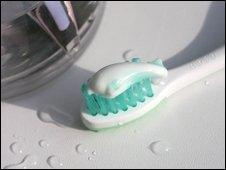Brush teeth to 'prevent' heart disease
- Published

Dentists recommend brushing twice a day
People who fail to brush their teeth twice a day are putting themselves at risk of heart disease, research suggests.
The Scottish study of more than 11,000 adults backs previous research linking gum disease with heart problems.
The researchers said more work is needed to confirm if poor oral health directly causes heart disease or is a marker of risk.
A charity added that oral hygiene was just one factor in good heart health.
It is known that inflammation in the body, including in the mouth and gums, has an important role in the build up of clogged arteries, which can lead to a heart attack.
But this is the first time that researchers have looked at whether the frequency of teeth brushing has any bearing on the risk of developing heart disease.
Data, published in the was collected on lifestyle behaviours, such as smoking, physical activity and oral health routines.
Participants were also asked how often they visited the dentist and how often they brushed their teeth.
Then nurses collected information on medical history and family history of heart disease, took blood pressure and blood samples.
Overall, six out of 10 people said they visited the dentist every six months and seven out 10 reported brushing their teeth twice a day.
Over the eight-year study there were 555 "cardiovascular events" such as heart attacks, 170 of which were fatal.
Taking into account factors that affect heart disease risk, such as social class, obesity, smoking and family history, the researchers found those with the worst oral hygiene had a 70% increased chance of developing the condition compared with those who brush their teeth twice a day.
Those with poor oral hygiene also tested positive in blood samples for proteins which are suggestive of inflammation.
Cause and effect
Study leader Professor Richard Watt, from University College London, said future studies will be needed to confirm whether the link between oral health behaviour and cardiovascular disease "is in fact causal or merely a risk marker".
Judy O'Sullivan, senior cardiac nurse at British Heart Foundation, said: "If you don't brush your teeth, your mouth can become infected with bacteria which can cause inflammation.
"However, it is complicated by the fact that poor oral hygiene is often associated with other well known risk factors for heart disease, such as smoking and poor diet."
She added: "Good personal hygiene is a basic element of a healthy lifestyle.
"But if you want to help your heart, you should eat a balanced diet, avoid smoking and take part in regular physical activity."
Professor Damien Walmsley, scientific adviser to the British Dental Association, added it was still unclear whether there was a definite cause and effect between oral hygiene and heart disease.
"Whatever the true position is, we can say with certainty that if people brush teeth twice a day with fluoride toothpaste, visit the dentist regularly and restrict sugary snacks to mealtimes; that this will go a long way towards keeping the teeth and gums in a healthy state for life."